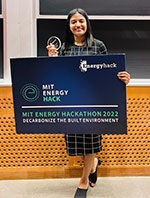A Window Into Her Success
Rupa Bhagwat talks about how lessons learned in MEM helped her finish third in the MIT EnergyHack 2022 competition despite not having a background with the energy industry.
Rupa Bhagwat did not have experience with the energy industry before participating in the MIT EnergyHack 2022 competition, but that didn't stop her from helping an up-and-coming climate technology startup consider how to showcase its product to potential customers.
“Entering into unknown territory sounds scary sometimes," she said, "but you just have to take one bold step.”
 Bhagwat took that step, and it was worth it. She and a team of four other students partnered for the hackathon competition and wound up finishing third at the event, which featured 102 teams and more than 400 students from around the globe.
Bhagwat took that step, and it was worth it. She and a team of four other students partnered for the hackathon competition and wound up finishing third at the event, which featured 102 teams and more than 400 students from around the globe.
Each team was presented with a challenge from one of 10 sponsor companies looking to address pressing needs related to energy or the environment.
Bhagwat's team was made up of one other Northwestern student and three from MIT. Their task was to conceptualize a communication platform for Boulder, Colo.-based Tynt Technologies to demonstrate the benefits of its dynamic windows to customers’ wallets and the environment.
“Tynt was taken aback by the amount of work we managed to finish in the 36 hours of the hack,” Bhagwat said. “They said they were amazed by looking at the app we developed.”
Tynt was founded in 2020 and named one of Business Insider’s 37 most promising climate-tech startups for 2022. The company’s windows use a patented energy efficient technology called Reversible Metal Electrodeposition to dynamically control light and heat flow during different seasons and at different times of the day. The windows also tint to any level to match customers’ privacy desires.
Bhagwat and her teammates designed the framework for a mobile app that would help homeowners calculate the carbon dioxide emission reductions and energy savings Tynt’s windows could bring them before they make the investment. The goal was to show the positive environmental impact the windows could bring as well as how long it would take to recoup the investment through lower electric bills.
EnergyHack teams presented their solutions to company representatives, industry judges, and fellow hackers; the most highly rated teams advanced to continue the work through the two-day event. Bhagwat and her teammates presented virtually to Tynt's CEO and cofounder, who selected them to advance to the finals over any other team that presented to Tynt.
“Securing a place among the top 10 was amazing and overwhelming,” she said. “When we secured a third-place finish, we were so excited.”
Bhagwat said she leaned on what she’s already learned during her time in MEM to help her throughout the event. Most valuable to her were the lessons she's learned about presentation preparation and delivery.
Finishing so strongly among such strong competition has given Bhagwat confidence as she works toward her MEM graduation in June. It’s also shown her the power of collaboration when tackling tough problems that need innovative answers.
“This experience gave me insights about how other students think in terms of on-the-spot challenges and how to prioritize the tasks to get one good solution,” she said. “It’s an honor to be a part of such an intellectual platform.”

